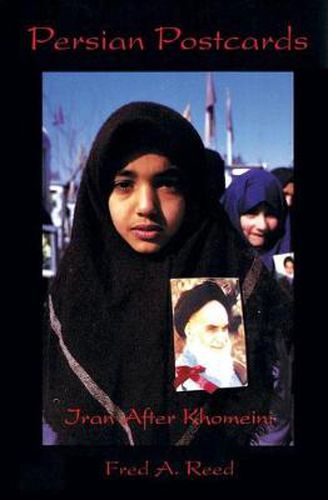Readings Newsletter
Become a Readings Member to make your shopping experience even easier.
Sign in or sign up for free!
You’re not far away from qualifying for FREE standard shipping within Australia
You’ve qualified for FREE standard shipping within Australia
The cart is loading…






In an age when visual images have become infinitely manipulable, and have thus forfeited their credibility, words alone can convey the multifaceted, fleeting, elastic yet intractable truth of memory and events. Persian Postcards, the fruit of ten years of travel to the Islamic Republic as both journalist and impassioned observer, is an attempt to suggest the depth and the complexity, the tragedy and raw beauty of this truth. Fred Reed went to Iran driven by discontent with the official Western view that country as a den of fundamentalist fanatics and terrorists. Not surprisingly, he found that the Iranians had reasons-excellent reasons-for acting as they did. The Iran-Iraq war, cynically prolonged by the Western powers who armed Saddam Hussein against Khomeini’s poorly armed but highly motivated revolutionary guards and volunteers, furnished the most conclusive example. Iranian history, in its meeting with the peculiar traditions of Shi'ite Islam, provided a wealth of others. In Persian Postcards, Iranians of many persuasions speak on the issues of their society, on regional politics, on the role of religion in life, on public and private morality. We meet artists and filmmakers, philosophers and mollahs, establishment men and dissidents, women speaking on women’s issues and on life, members of parliament and terrorists.
Chronologically discontinuous, Persian Postcards draws a deeper thematic unity from places and events: the funeral of Imam Khomeini at Behesht-e Zahra cemetery, the Assassin castle of Alamut, the great mosques of Isfahan, the shady sidewalks of Vali-ye Asr Avenue in downtown Tehran, rural reconstruction projects in the mountains of Rudbar. Persian Postcards is more than a journalistic report, an academic treatise, or a travel book, although it enfolds elements of all three. It explores an unknown quarter, a territory inhabited by people of culture, dignity and poetic genius, moved by forces which defy the impoverished classification theology of
$9.00 standard shipping within Australia
FREE standard shipping within Australia for orders over $100.00
Express & International shipping calculated at checkout
In an age when visual images have become infinitely manipulable, and have thus forfeited their credibility, words alone can convey the multifaceted, fleeting, elastic yet intractable truth of memory and events. Persian Postcards, the fruit of ten years of travel to the Islamic Republic as both journalist and impassioned observer, is an attempt to suggest the depth and the complexity, the tragedy and raw beauty of this truth. Fred Reed went to Iran driven by discontent with the official Western view that country as a den of fundamentalist fanatics and terrorists. Not surprisingly, he found that the Iranians had reasons-excellent reasons-for acting as they did. The Iran-Iraq war, cynically prolonged by the Western powers who armed Saddam Hussein against Khomeini’s poorly armed but highly motivated revolutionary guards and volunteers, furnished the most conclusive example. Iranian history, in its meeting with the peculiar traditions of Shi'ite Islam, provided a wealth of others. In Persian Postcards, Iranians of many persuasions speak on the issues of their society, on regional politics, on the role of religion in life, on public and private morality. We meet artists and filmmakers, philosophers and mollahs, establishment men and dissidents, women speaking on women’s issues and on life, members of parliament and terrorists.
Chronologically discontinuous, Persian Postcards draws a deeper thematic unity from places and events: the funeral of Imam Khomeini at Behesht-e Zahra cemetery, the Assassin castle of Alamut, the great mosques of Isfahan, the shady sidewalks of Vali-ye Asr Avenue in downtown Tehran, rural reconstruction projects in the mountains of Rudbar. Persian Postcards is more than a journalistic report, an academic treatise, or a travel book, although it enfolds elements of all three. It explores an unknown quarter, a territory inhabited by people of culture, dignity and poetic genius, moved by forces which defy the impoverished classification theology of